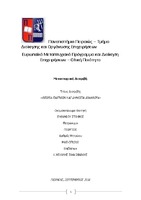Θεωρία παιγνίων και δημόσια διαφθορά

Προβολή/
Λέξεις κλειδιά
Θεωρία παιγνίων ; Διαφθορά ; Δημόσιο χρέος ; Οικονομική κρίση ; Χρηματιστήριο Αξιών ΑθηνώνΠερίληψη
Η θεωρία παιγνίων είναι διαδεδομένη στην οικονομία. Έχοντας, εδώ και πολύ
καιρό εισβάλει στις βιομηχανικές οργανώσεις, το μοντέλο της θεωρίας
παιγνίων είναι πλέον ένας κοινός τόπος σε διεθνή, μακροοικονομικά και
δημόσια χρηματοοικονομικά, και συγκεντρώνει την ιστορία ανάπτυξης και την
οικονομική ιστορία. Πολλοί μοντελιστές χρησιμοποιούν τη θεωρία παιγνίων
διότι τους επιτρέπει να σκέφτονται σαν οικονομολόγοι, όταν η θεωρία της
τιμής δεν μπορεί να εφαρμοστεί. Τα μοντέλα της θεωρίας παιγνίων, δηλαδή,
επιτρέπουν στους οικονομολόγους να μελετούν τις επιπτώσεις του
ορθολογισμού, της ιδιοτέλειας και της ισορροπίας τόσο στις αγορές
αλληλεπιδράσεων που μοντελοποιούνται/προσομοιώνονται ως παίγνια (όπου
οι μικροί αριθμοί, οι κρυφές πληροφορίες, οι κρυφές ενέργειες ή οι ελλιπείς
συμβάσεις είναι παρούσες) όσο και στις μη εμπορικές αλληλεπιδράσεις (όπως
ανάμεσα σε έναν ρυθμιστή και μια επιχείρηση, σε ένα αφεντικό και έναν
εργαζόμενο, και ούτω ο καθεξής). Πολλοί οικονομολόγοι φαίνεται να εκτιμούν
ότι η θεωρία παιγνίων μπορεί να συμπληρώσει τη θεωρία της τιμής με αυτόν
τον τρόπο, αλλά παρ 'όλα αυτά τη βρίσκουν περισσότερο ως ένα εμπόδιο
εισόδου παρά ως ένα χρήσιμο εργαλείο (Gibbons, 2009).


